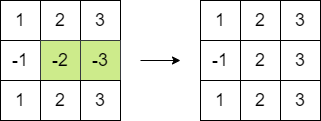| comments | difficulty | edit_url | rating | source | tags | |||
|---|---|---|---|---|---|---|---|---|
true |
Medium |
1648 |
Biweekly Contest 59 Q2 |
|
You are given an n x n integer matrix. You can do the following operation any number of times:
- Choose any two adjacent elements of
matrixand multiply each of them by-1.
Two elements are considered adjacent if and only if they share a border.
Your goal is to maximize the summation of the matrix's elements. Return the maximum sum of the matrix's elements using the operation mentioned above.
Example 1:
Input: matrix = [[1,-1],[-1,1]] Output: 4 Explanation: We can follow the following steps to reach sum equals 4: - Multiply the 2 elements in the first row by -1. - Multiply the 2 elements in the first column by -1.
Example 2:
Input: matrix = [[1,2,3],[-1,-2,-3],[1,2,3]] Output: 16 Explanation: We can follow the following step to reach sum equals 16: - Multiply the 2 last elements in the second row by -1.
Constraints:
n == matrix.length == matrix[i].length2 <= n <= 250-105 <= matrix[i][j] <= 105
If there is a zero in the matrix, or the number of negative numbers in the matrix is even, then the maximum sum is the sum of the absolute values of all elements in the matrix.
Otherwise, if there are an odd number of negative numbers in the matrix, there will be one negative number left in the end. We choose the number with the smallest absolute value and make it negative, so that the final sum is maximized.
The time complexity is
class Solution:
def maxMatrixSum(self, matrix: List[List[int]]) -> int:
mi = inf
s = cnt = 0
for row in matrix:
for x in row:
cnt += x < 0
y = abs(x)
mi = min(mi, y)
s += y
return s if cnt % 2 == 0 else s - mi * 2class Solution {
public long maxMatrixSum(int[][] matrix) {
long s = 0;
int mi = 1 << 30, cnt = 0;
for (var row : matrix) {
for (int x : row) {
cnt += x < 0 ? 1 : 0;
int y = Math.abs(x);
mi = Math.min(mi, y);
s += y;
}
}
return cnt % 2 == 0 ? s : s - mi * 2;
}
}class Solution {
public:
long long maxMatrixSum(vector<vector<int>>& matrix) {
long long s = 0;
int mi = 1 << 30, cnt = 0;
for (const auto& row : matrix) {
for (int x : row) {
cnt += x < 0 ? 1 : 0;
int y = abs(x);
mi = min(mi, y);
s += y;
}
}
return cnt % 2 == 0 ? s : s - mi * 2;
}
};func maxMatrixSum(matrix [][]int) int64 {
var s int64
mi, cnt := 1<<30, 0
for _, row := range matrix {
for _, x := range row {
if x < 0 {
cnt++
x = -x
}
mi = min(mi, x)
s += int64(x)
}
}
if cnt%2 == 0 {
return s
}
return s - int64(mi*2)
}function maxMatrixSum(matrix: number[][]): number {
let [s, cnt, mi] = [0, 0, Infinity];
for (const row of matrix) {
for (const x of row) {
if (x < 0) {
++cnt;
}
const y = Math.abs(x);
s += y;
mi = Math.min(mi, y);
}
}
return cnt % 2 === 0 ? s : s - 2 * mi;
}impl Solution {
pub fn max_matrix_sum(matrix: Vec<Vec<i32>>) -> i64 {
let mut s = 0;
let mut mi = i32::MAX;
let mut cnt = 0;
for row in matrix {
for &x in row.iter() {
cnt += if x < 0 { 1 } else { 0 };
let y = x.abs();
mi = mi.min(y);
s += y as i64;
}
}
if cnt % 2 == 0 {
s
} else {
s - (mi as i64 * 2)
}
}
}/**
* @param {number[][]} matrix
* @return {number}
*/
var maxMatrixSum = function (matrix) {
let [s, cnt, mi] = [0, 0, Infinity];
for (const row of matrix) {
for (const x of row) {
if (x < 0) {
++cnt;
}
const y = Math.abs(x);
s += y;
mi = Math.min(mi, y);
}
}
return cnt % 2 === 0 ? s : s - 2 * mi;
};
